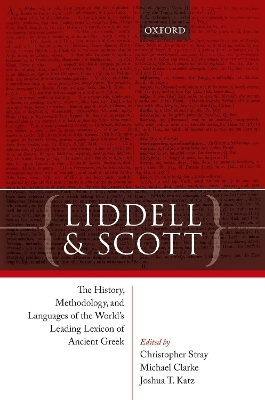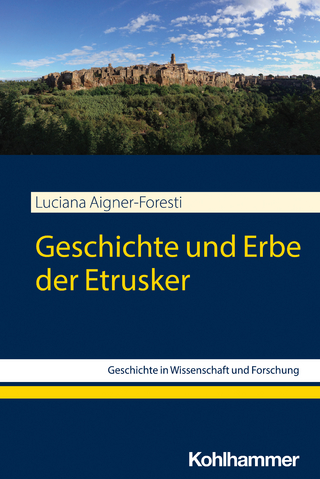
Liddell and Scott
Oxford University Press (Verlag)
978-0-19-881080-3 (ISBN)
The Greek-English Lexicon of Liddell and Scott is one of the most famous dictionaries in the world, and for the past century-and-a-half has been a constant and indispensable presence in teaching, learning, and research on ancient Greek throughout the English-speaking world and beyond. Despite continuous modification and updating, it is still recognizably a Victorian creation; at the same time, however, it carries undiminished authority both for its account of the Greek language and for its system of organizing and presenting linguistic data.
The present volume brings together essays by twenty-two scholars on all aspects of the history, constitution, and problematics of this extraordinary work, enabling the reader both to understand its complex history and to appreciate it as a monument to the challenges and pitfalls of classical scholarship. The contributors have combined a variety of approaches and methodologies - historical, philological, theoretical - in order to situate the book within the various disciplines to which it is relevant, from semantics, lexicography, and historical linguistics, to literary theory, Victorian studies, and the history of the book. Paying tribute to the Lexicon's enormous effect on the evolving theory and practice of lexicography, it also includes a section looking forward to new developments in dictionary-making in the digital age, bringing comprehensively up to date the question of what the future holds for this fascinating and perplexing monument to the challenges of understanding an ancient language.
Christopher Stray is Honorary Research Fellow in the Department of Classics, Ancient History, and Egyptology at Swansea University. He has held visiting positions at Wolfson College, Cambridge; the Beinecke Library, Yale University; and at the Institute for Advanced Study, Princeton. He works on the history and sociology of classical teaching and learning at school and university level, and has also published on examinations, institutional slang, and textbooks. He contributed three chapters to the History of Oxford University Press, and is currently working on contributions to a forthcoming history of Trinity College, Cambridge. Michael Clarke is Professor of Classics at the National University of Ireland, Galway. His early research was closely focused on Homeric epic, with publications including Flesh and Spirit in the Songs of Homer (OUP, 2000). Since that time he has pursued two complementary research directions: historical semantics and language change on the one hand and comparative approaches to epic and myth on the other. He is the author of numerous studies of classical influences on medieval literatures, and is working on a long-term study of Togail Troí, the Middle Irish saga of the Trojan War. Joshua T. Katz is Cotsen Professor in the Humanities, Professor of Classics, and a member of the Program in Linguistics at Princeton University, where he has taught since 1998. A linguist by training, a classicist by profession, and a comparative philologist at heart, he has published widely in the languages, literatures, and cultures of the ancient world, from India to Ireland via Greece, Rome, and the Near East. His recent work has concentrated on how Archaic Greek poems begin, as well as on the history and practice of wordplay, but he maintains an active interest in Vergil, etymology, and badgers.
Frontmatter
List of Figures and Tables
List of Abbreviations
List of Contributors
Christopher Stray: A Note on the History of the Lexicon
I. HISTORY AND CONSTITUTION OF THE LEXICON
1: Christopher Stray: Liddell and Scott in Historical Context: Victorian Beginnings, Twentieth-Century Developments
2: Margaret Williamson: Dictionaries as Translations: English in the Lexicon
3: David Butterfield: Latin in the Lexicon
4: Amy Coker: Obscenity: A Problem for the Lexicographer
5: Joshua T. Katz: Etymology and Etymologies in the Lexicon
II. PERIODS AND GENRES OF EVIDENCE
6: Brent Vine: Incorporating New Evidence: Mycenaean Greek in the Revised Supplement (1996)
7: Tom Mackenzie: A Canonical Author: The Case of Hesiod
8: Christopher Rowe: Philosophy and Linguistic Authority: The Problem of Plato's Greek
9: Elizabeth Craik: Medical Vocabulary, with Especial Reference to the Hippocratic Corpus
10: Patrick James: The Greek of the New Testament
11: Mark Janse: The Ancient, the Medieval, and the Modern in a Greek-English Lexicon, or How To Get Your Daily 'Bread' in Greek Any Day Through the Ages
12: Philomen Probert: Greek Dialects in the Lexicon
13: Evelien Bracke: Between Cunning and Chaos: mêtis
III. METHODOLOGY AND PROBLEMS
14: Michael Clarke: Looking for Unity in a Dictionary Entry: A Perspective from Prototype Theory
15: David Goldstein: Discourse Particles in LSJ: A Fresh Look at *g*e
16: James Clackson: LSJ and the Diachronic Taxonomy of the Greek Vocabulary
17: Michael Silk: Literary Lexicography: Aims and Principles
IV. COMPARISONS IN TIME AND SPACE
18: Michael Meier-Brügger: Lessons Learned During my Time at the Lexikon des frühgriechischen Epos (LfgrE)
19: Martin L. WestDR: Diminishing Returns and New Challenges
20: Anne Thompson: bápt=o: An Illustration of the State of our Ancient Greek Dictionaries
21: John Considine: Liddell and Scott and the Oxford English Dictionary
Endmatter
Bibliography
Index
| Erscheinungsdatum | 04.12.2019 |
|---|---|
| Zusatzinfo | 19 black-and-white illustrations |
| Verlagsort | Oxford |
| Sprache | englisch |
| Maße | 162 x 241 mm |
| Gewicht | 886 g |
| Themenwelt | Geschichte ► Allgemeine Geschichte ► Altertum / Antike |
| Geisteswissenschaften ► Sprach- / Literaturwissenschaft ► Sprachwissenschaft | |
| ISBN-10 | 0-19-881080-6 / 0198810806 |
| ISBN-13 | 978-0-19-881080-3 / 9780198810803 |
| Zustand | Neuware |
| Informationen gemäß Produktsicherheitsverordnung (GPSR) | |
| Haben Sie eine Frage zum Produkt? |
aus dem Bereich


